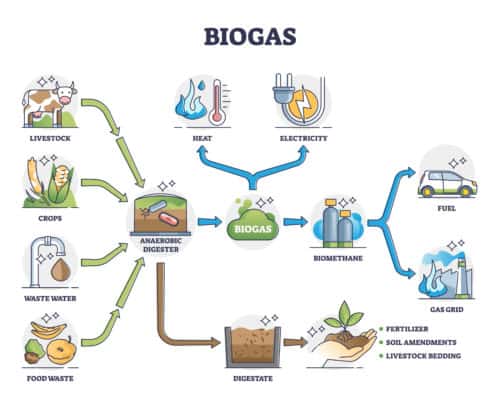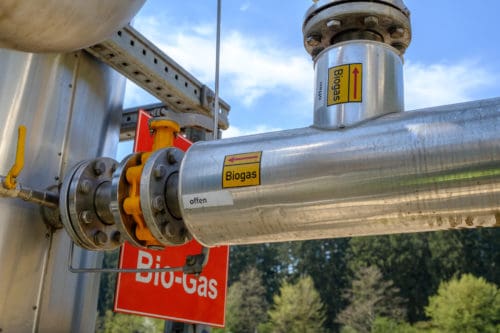
Biogas is a clean, renewable source of energy that generally contains methane, carbon dioxide, some nitrogen, and trace amounts of hydrogen, hydrogen sulfide, ammonia, and other volatile organics. It’s a by-product of anaerobic digestion, in which microorganisms break down organic matter like an animal, food, or other waste within an enclosed environment that lacks oxygen. This process can happen naturally or industries like the fuel sector can activate it intentionally for energy production.
Since biogas-derived energy is usually produced from waste that would otherwise need to be disposed of, it has the potential to help create a more sustainable future. Read on to learn why it’s such an important and beneficial energy option.
Importance of Biogas
As the world gravitates toward more sustainable processes, biogas has excellent potential to play an important role, in supplementing or even replacing natural gas. You can use biogas to generate electricity, heat, and light, and this eco-friendly energy source is gaining wider acceptance as a greener type of fuel. It provides renewable energy, helps to reduce greenhouse gas emissions and mitigate climate change, and doesn’t require drilling. Compared to traditional fossil fuels like oil and gas, biogas offers several advantages.
Checkout Our Ebook Library
View Ebooks
Biogas Energy Advantages and Disadvantages
Like any form of energy, there are benefits and drawbacks that are considered when developing biogas energy projects.
Advantages
Utilizing biogas energy is highly advantageous for its:
- Environmental friendliness. Biogas generation is a natural and sustainable process. You don’t need virgin natural resource input or combustion to produce the gas. And with proper treatment, it can be used as a substitute fuel in many combustion applications.
- Dependability. Industrial, agricultural, and other wastes are abundantly available in many regions, and the biogas derived from them will also be reliable and readily available. Biogas does not depend on nonrenewable resources like oil or coal.
- Pollution reductions for water and soil. Biogas energy reduces water and soil pollution indirectly by using waste that could otherwise end up in the environment. Also, the anaerobic digestion that takes place during biogas production minimizes the risk of waterborne illnesses by deactivating parasites and viruses.
- Capability to create organic fertilizers. Biogas’ enriched by-product, organic digestate, may be permitted in some regions to be used as an organic fertilizer for the agricultural sector as long as contaminant levels are probably low.
- Circular economy support. Compared to some traditional energy sources, biogas technologies are relatively simple and economical, making them an attractive option for some low-investment small-scale energy solutions. This energy form supports a circular economy by utilizing waste that would otherwise be cost-prohibitive to remove.
Disadvantages
As for the potential downsides to biogas energy:
- Biogas has impurities in it. Even though biogas undergoes a refining and compression process, it can still contain impurities. These impurities sometimes make the biogas unusable as an input for the natural gas grid without upgrading, as it could otherwise cause corrosion. Some impurities may also make the solid byproducts unsuitable for agriculture fertilizer applications.
- It isn’t applicable in every location. An essential factor for biogas production is the reliable availability of usable organic waste matter. Biogas is not viable in areas that produce no little or no waste material inputs.
- The biogas production process is temperature-sensitive. The temperature of the environment in which you’re producing the biogas must be suitable for the bacteria to effectively break down the organic matter. A temperature of 37°C is ideal for biogas production. Otherwise, you may need to either provide some external heat energy or sufficient shelter to enable the process.
 Products for Biogas Production From Nova Analytical Systems
Products for Biogas Production From Nova Analytical Systems
For over four decades, Nova Analytical Systems has offered reliable gas analysis equipment to clients in traditional and emerging industries worldwide. Our extensive catalog includes portable and continuous gas analyzers along with sample conditioning equipment. As a division of Tenova Goodfellow Inc., our team is experienced in designing and manufacturing innovative, high-tech equipment, including products like the 920 Series Continuous Biogas Analyzers and the Nova 910 Series Continuous Landfill Gas Analyzers that play a vital part in biogas production.
Contact us to learn more about sustainable energy and how our accurate products can help support you in biogas production, or request a quote today to start your next project.


Comments are closed